Your water softener seems to have been running for far too long or it is making a sound that you have never heard before. What should you do? Should you just unplug it, what would happen if you unplug your water softener?
When you unplug a water softener, it will stay in whatever cycle it is currently in. It may lose its programming and it will not stop water from discharging from the water softener or stop it from leaking.
A water softener is a mechanical device that will simply continue to do whatever it is currently doing if you unplug it. If you are having a problem with your water softener, check out a few things before you simply unplug it.
What Will Happen When You Unplug Your Water Softener?
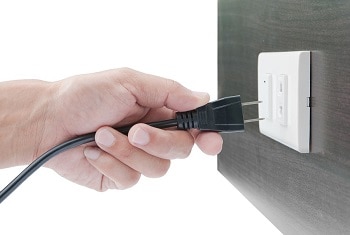
- Your Water May Still Be Soft After You Unplug Your Water Softener.
The water softener resin in your water softener may still be able to soften your water (for a while).
- The Water Softener Resin In Your Water Softener Will Not Get Regenerated.
At some point, after you unplug a water softener the resin will no longer be able to remove hardness from your water.
- Your Water Softener May Continue To Run After You Unplug It!
If your water softener is running when you unplug it, it will continue to run when it is unplugged.
- Your Plumbing May Develop Condensation.
If your water softener is using water when you unplug it, it will continue to use water which can cause condensation to form on your plumbing.
- Your Well Could Run Dry.
Unplugging a water softener will not stop it from using water which could lead to your well running dry if the water softener is using water when you unplug it.
- Your Water Softener Computer May Lose Its Programming.
When you unplug a water softener, its computer may lose information that has been programmed into it (what time of day it will regenerate, water hardness, etc.).
- Unplugging Your Water Softener Will Not Stop It From Leaking Or Overflowing!
A water softener that is full of water, leaking, or overflowing will not stop leaking or overflowing when unplugged because water will still be going into the water softener.
- Hard Minerals And Iron Could Build Up In Your Water Softener Control Valve!
Without electricity, a standard water softener will not remove hard minerals for long and they can build up in your water softener’s control valve.
When you unplug a water softener, water will still be able to run through the water softener which means that the water for your home may remain soft for a period of time until the water softener resin is unable to remove any more hardness from your water.
Unplugging a water softener will not stop water from flowing through it which means that water from your water softener may continue to go down the drain which can lead to condensation forming on your homes’ plumbing and could even run your well dry.
Because your hard water will continue to flow through your water softener after it has been unplugged, leaks will not stop leaking and hard water could find its way into your water softeners’ control valve which may harm the valve.
Unplugging Your Water Softener Is Not The Same As Bypassing Your Water Softener!
When you unplug your water softener you are simply shutting off the electricity to the water softener computer that determines what the mechanical components of the water softener should do.
Unplugging a standard water softener does not make it open or close water valves or divert your home’s water from going through the water softener.
If you need to stop your home’s water from flowing into and out of your water softener, you need to “BYPASS” your water softener.
Bypassing a water softener is done by closing valves that allow water in and out of your water softener and opening valves that allow your home’s water to continue into your home without going through your water softener.
Bypassing a water softener is done by using the water softener bypass valve and not by unplugging the water softener.
There are a few different types of water softener bypass valves. You may need to turn 1 or 2 knobs, turn 1 or more levers or perhaps press in a plunger-type piston to bypass your water softener.
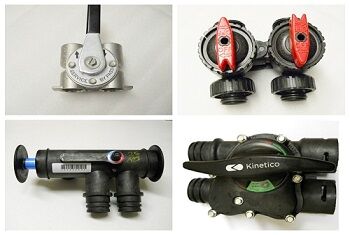
If you need to stop water going into your water softener because of a leak or your water softener is continuously discharging water, look for the water softener bypass valve where your plumbing meets the water softener valve.
Will Unplugging My Water Softener Increase My Water Pressure?
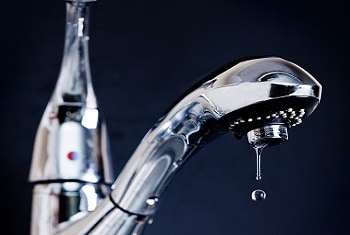
Anytime that water has to pass through any type of media or filter it will affect the water pressure to some degree.
Under normal circumstances, a water softener will have little effect on your water pressure, and unplugging the water softener will generally not have any effect on your water pressure because the water will still need to pass through the water softener resin.
You may experience a drop in water pressure when your water softener is regenerating or if your water softener continues to drain water even after it is done regenerating.
Even though a standard water softener will bypass itself during its regeneration process, it will still be using a fair amount of water which can cause a drop in your home’s water pressure, and unplugging the water softener will not stop the regeneration.
Experiencing poor water pressure and want to figure out if it is caused by your water softener? Learn more by checking out my article about “Can A Water Softener Affect Water Pressure?”.
If you are noticing a significant loss of water pressure and you think that it may be caused by your water softener, bypassing the water softener will stop water from going through it but still provide water to your home.
If you unplug your water softener, your home’s water will continue to flow through the water softener and there should be no change in your home’s water pressure.
Will A Water Softener Stop Discharging Water If I Unplug It?
When you unplug a water softener, the water softener will continue to do whatever it was doing at the time that it was unplugged.
If the water softener was not discharging water when you unplug it, it will not discharge any water after you unplug it and if it is discharging water when you unplug it, it will not stop discharging water just because it has been unplugged.
Unplugging a water softener will stop the electronic and mechanical components of a water softener from operating but it will not affect water going in or out of the water softener.
Is your water softener draining NON-STOP? Learn more about why it is in my article “Why Is My Water Softener Draining NON-STOP?”.
Should I Unplug My Water Softener If It Is Making A Strange Sound Or Odor?
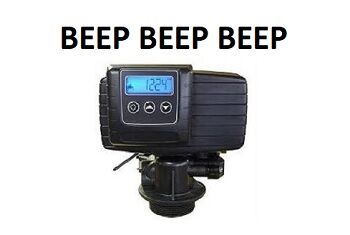
In some cases, a water softener making a strange sound is due to an electrical or mechanical part malfunctioning which could lead to a serious problem but this is quite rare.
As parts of the water softener age, they become worn or damaged which can produce noises as they make contact with each other. These noises are expected and common as a water softener gets older.
However, any type of burning or electrical odor coming from a water softener control is not normal and should be checked.
If your water softener is making an unfamiliar noise or if there is any type of odd odor coming from it that may be caused by an electrical component, it is a wise idea to unplug and bypass the water softener until it can be checked by a water treatment service person.
Find out more about why your water softener is making noises in my articles “Why Is My Water Softener BEEPING? and “Why Is My Water Softener Making Noise?.
Can I Reset My Water Softener By Unplugging It?
When you unplug a water softener, you are basically unplugging the water softeners’ computer.
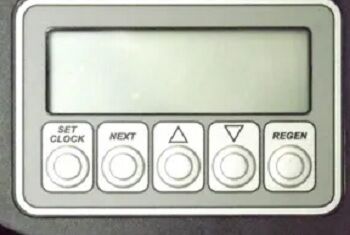
Unplugging a water softener will not reset your water softener to the in-service (softening) position or stop it from discharging water.
Although, many water softeners have a backup battery to save the basic information that has been programmed into the water softeners’ computer for a short time if there is a loss of power, unplugging the water softener for a long period of time can cause the computer to lose its programming and revert to its original factory settings.
If your water softeners’ computer has experienced a power outage or electrical spike, it may trigger an error code which you may be able to reset by unplugging the water softener computer for a few minutes.
But before you unplug your water softener to try to reset it, check your owner’s manual to determine what the error code means and what may have caused the error to occur.
If there is a way to reset your water softeners’ computer without unplugging the computer you should be able to retain any programming that has been done to the computer to properly treat your water.
If My Water Softener Brine Tank Is Overflowing, Should I Unplug It?
Generally, unplugging a water softener will have no effect on water flowing into your water softeners’ brine tank.
An overflowing brine tank is usually due to a leaking seal or a failing brine float assembly and has nothing to do with the electrical or mechanical parts of a water softener that are powered by electricity.
Learn more about why your water softener is overflowing in my article “Why Is My Water Softener Overflowing?”
To stop your water softener brine tank from overflowing you should bypass the water softener to divert additional water from flowing into the brine tank rather than unplugging the water softener.
My Water Is Orange/Brown, Should I Unplug My Water Softener?
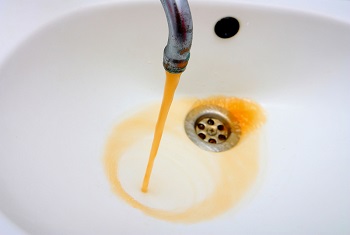
Generally, brown water coming from a water softener will not be affected by unplugging the water softener. Unplugging a water softener will not stop brown water from coming out of a water softener.
Brown water coming from your water softener is usually due to a change in your water source or from your water softener not regenerating its water softener resin properly.
If the water coming to your home has sediment or a high amount of iron in it, your water may appear brown.
A water softener is not a sediment filter so sediment or non-dissolved iron will not be removed by a standard water softener.
Installing a sediment pre-filter before your water softener will remove sediment and non-dissolved iron (Ferric Iron) from your water.
Although a water softener can remove dissolved iron (Ferrous Iron), if the dissolved iron is not removed from your water softener’s resin properly, it can build up and then cause your water to appear brown when the resin can no longer remove more.
Older water softener resin will lose its ability to remove dissolved iron over time and your water may appear brown because the resin simply can’t remove the dissolved iron any longer.
Unplugging your water softener should have no significant effect on brown water coming from your water source. Sediment and non-dissolved iron will pass through a water softener whether it is plugged in or not.
If you experience brown water due to your water softener resin not being regenerated properly, unplugging the water softener will stop it from regenerating the water softener resin completely and it may make your brown water even worse.
When you experience brown water, try bypassing your water softener first rather than unplugging it to see if your water is becoming brown because of your water softener.
If your water comes out clear or clearer after bypassing your water softener, your water softener is likely not removing all of the dissolved iron from your water and may need to be serviced.
If you bypass your water softener and your brown water does not change, you are likely getting sediment or iron coming from your water source that cannot be removed by your water softener.
Check out my article “Why Is My Water Orange” for more about why you have orange/brown water.
Will A Water Softener Regenerate If It Is Unplugged?
An electrical water softener will NOT regenerate if it is unplugged because it requires electricity to power its drive motor and its computer which controls the regeneration functions of the system.
Without electricity, a standard electrical water softener will have no way of knowing when and how to regenerate its water softening resin.
The water softeners computer needs electricity to operate the mechanical functions of the control valve which performs the regeneration process.
Will It Hurt My Water Softener If I Unplug It?
Because your water softener will not be able to regenerate its water softener resin if you unplug it, hard minerals and iron can eventually pass through the water softener and build up inside of the control valve and cause it to fail.
The water softener resin inside of a water softener needs to be regenerated regularly to remove hard minerals and iron from your water.
When you unplug a water softener, the water softener will no longer regenerate its water softener resin which can damage the resin to the point where it will no longer be able to remove hardness and iron from your water.
To Sum Up:
If you unplug a water softener, untreated water will continue to flow through the water softener resin and control valve.
If your water softener is using water to regenerate its water softener resin and you unplug the water softener, water will continue to flow through the water softener just as it was before you unplugged it.
Only unplug your water softener if it is making a loud noise or if you experience an odd odor coming from the water softener control valve.
Bypassing your water softener is often the best choice if you are experiencing a problem with your water softener leaking or if your water softener is draining continuously.



Is my water ok if I unplug the softner, but don’t by-pass the softening unit?
Hello Lorie and thank you for the question.
Unplugging your water softener will only stop it from removing hard minerals from your water. You may have soft water for a while but that does not mean that your water will be any better or worse than it was before you unplugged it.
A water softener is not a water purifier and since I don’t know the characteristics of your water, I can’t say if your water will be better or worse than it was before.
I hope this was helpful.
Paul
I unplugged my water softener about a year ago because it was out of salt. I never refilled the salt so just left it. I didn’t stop to think about the water actually going through it. We just had to have the water heater replaced due to it leaking and damage. Now I am wondering if we need to bypass (or shut the water off to the conditioner since we aren’t using it) and if there is actually water in there that can leak too.
Hello Linda and thank you for the question.
Under normal circumstances, there is always water inside a water softener, if the water softener is not bypassed, water will continue to go through it under pressure.
Although not common, a water softener can leak from connections and cracks can develop but if there is a water softener in your home, it is probably there because your water has a significant amount of hardness in it which can damage your water fixtures, appliances, and dishware over time.
Before you decide to simply bypass the water softener, your should test your water for hardness and begin to use the water softener again to soften your water.
If you are planning on purchasing a new water softener, you can go ahead and bypass the old water softener for now, but I wouldn’t recommend bypassing the water softener without considering why the water softener was installed in the first place.
I hope this was helpful.
Paul
Your article was very helpful, thank you for the rare “straight talk”. So as to avoid unplugging my softener, I tried to push the big white Bypass “stopper” on my Whirlpool unit. But it seems to be welded in place, perhaps never moved since original installation by the former homeowner. Then I tried to turn the water valves connecting the softener to the house plumbing, but they too are stuck in place. I applied maximum hand pressure [not a weak person] but they did not budge. I don’t want to break anything by using a mallet, but I do not own a plumbing wrench. Is there an alternative?
Second topic is my feeling that much of the water softener business is a scam. According to maps published by the United States Geological Survey [USGS], only a few locations in the U.S. even exceed 15 gpg; e.g., Salt Lake City or Austin, Texas. Yet my Whirlpool owners manual shows diagrams suggesting 20 or 25 gpg as seemingly “typical” hardness inputs to the unit’s computer. That is outrageous, being ‘off the chart’ of virtually all places in North America. Of course, when typical harried homeowners see those numbers in the big diagram, they may well input them as being reasonable guesses. This uses up way too much salt and guarantees excessively softened water, which clueless citizens then may think is ‘normal’. According to USGS surveys, the large majority of places in the U.S. do NOT need water softening.
Thank you for any suggestions of how I might deal with my stuck plastic Bypass stopper [approx. 1.5 inches in diameter] and/or metal pipe valves.
Hello Holly and thank you for the question.
It is very possible that the bypass has not been moved since installation. You could shut off the water to the water softener to relieve the pressure, then attempt to move the bypass valve, and then slowly turn the water back on but those bypasses will sometimes leak because the rings that create the water seal inside of the bypasses have become stiff.
If you still can’t move the bypass by hand, you could try using a rubber mallet and “LIGHTLY” tap the bypass many times to get it to move.
I DO NOT recommend trying this unless you are comfortable doing some basic plumbing just in case the bypass leaks or does get damaged.
I recommend trying this only during normal business hours just in case you need to call a plumber or get to the hardware store in case you need to get some parts.
The hardness of water can vary dramatically from one area to another. I have been to areas where the water in one home is 10 grains per gallon and just a few miles away the hardness could be 20 grains per gallon.
You can’t really go by the average hardness displayed on a map.
I usually only recommend getting a water softener if the hardness of your water exceeds 7 grains per gallon or contains dissolved iron.
I hope this was helpful.
Paul
Hi Paul. I discovered today that my Kenmore water softener was leaking. I was able to put it in bypass mode but the inspection/repair appointment is not for 2 weeks. Should I also unplug the unit until then or doesn’t it matter? It is a digital softener.
Hello Mary and thank you for the question.
There should be no reason to unplug the water softener as long as it is in bypass.
Unplugging the water softener may cause it to lose its computer programming and leaving the water softener plugged in should not cause any problems.
As a technician, I always want to see the water softener as it was when a problem occurred, including the computer’s programming which could be lost if you unplug the water softener.
I hope this was helpful.
Paul
Hi Paul,
I am going to be gone from my home for 6 weeks. My Bypass will not budge. If I turn off my main water valve and unplug my water softener will that damage the water softener? I understand my setting will be gone but hopefully I can figure that out when I return. I keep getting different answers. Thank you!
Hello Mary Ann and thank you for the question.
First, try shutting off the water to the water softener, turn on a faucet to relieve the water pressure and then try the bypass again. Relieving the water pressure usually makes it much easier to move a bypass.
Then you can leave the water softener plugged in and no water will be used but your computer settings will remain.
When you get back, take the water softener off the bypass and slowly turn the water back on.
If you decide to shut the water off and unplug the water softener there should be no damage to the system over a 6-week period but you may need to reprogram the computer settings.
I hope this was helpful.
Paul
My water softener got unpluged somehow and i dont know for sure if it is working, i took out almost all of the salt and reprogramed it 2:00am, but what’s left of the salt doesn’t seem to go down. What should I do ?
Hello Jan and thank you for the question.
A water softener does not typically regenerate every day, so it could take several days before it uses any salt from the brine tank.
Without knowing the brand and model of your water softener, I can’t describe precisely what to look for. Still, I suggest that you determine if the system is metering your water by turning on a kitchen or bath faucet, then look at the water softener display for any blinking indicator or number that indicates that water is being used.
You may see the time of day flashing, the picture of a water faucet flashing, or a number like .5, 1.0, etc that indicates that you are using .5 gallons per minute at that moment. Then shut off the faucet to see if the flashing stops, this will tell you that the water softener is metering your water usage and it should regenerate (use salt) once the programmed amount of water has been used.
Check that the bypass valve is in the “Service” position and the hardness is set correctly for your water.
You should find details in your owner’s manual or search online for the manual for your make and model water softener.
As I mentioned before, it could be several days before the water softener regenerates after you plug it back in and as long as nothing else was touched, the water softener will very likely resume normal operation after it has been plugged back in.
If the remaining salt does not go down after about 2 weeks, the system may need to be serviced by a water treatment technician to determine what could be wrong.
I hope this was helpful.
Paul